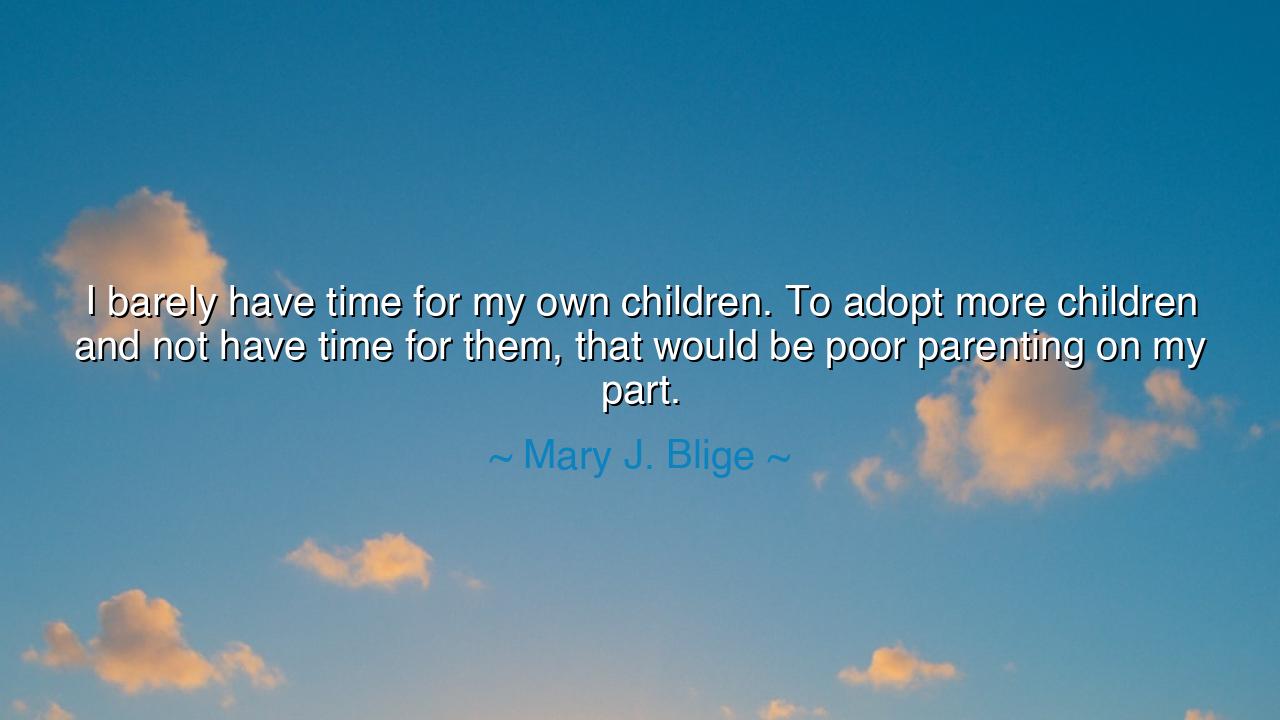
I barely have time for my own children. To adopt more children
I barely have time for my own children. To adopt more children and not have time for them, that would be poor parenting on my part.






Hear the words of Mary J. Blige, spoken with honesty and humility: “I barely have time for my own children. To adopt more children and not have time for them, that would be poor parenting on my part.” In these words lies the wisdom of self-awareness, the recognition that love is not measured by grand gestures alone but by presence, attention, and responsibility. She names a truth often forgotten in the whirlwind of good intentions: to take on the care of a child is not merely to provide shelter or sustenance, but to give the irreplaceable gift of time. Without time, parenting becomes a hollow name, for love must be embodied in presence.
The ancients knew this truth well. A king may raise armies and conquer nations, but if he cannot tend to his children, his legacy falters. Consider King David of Israel, who, though mighty and beloved, failed to guide his sons with steady presence. The result was turmoil within his household, rebellion among his heirs, and sorrow that overshadowed his throne. His story shows us that neglect—whether born of distraction, ambition, or lack of time—leaves wounds deeper than poverty. Mary J. Blige’s confession echoes this ancient warning: it is not greatness to take on more than you can love well.
Her words also carry a subtle rebuke to the vanity of overextension. In a world where adopting, providing, or giving more can be praised as noble, she reminds us that nobility without follow-through is folly. To take in more children when one’s time is already stretched thin would not be an act of love but of poor parenting. This is not selfishness but humility—the recognition that the heart, though vast in compassion, is bound by the hours of the day. True wisdom lies in knowing one’s limits, and in choosing to honor the responsibilities already entrusted to you.
There is also in her statement the recognition of what children most crave: presence. They may live in abundance, surrounded by wealth or opportunity, yet starve for the simple act of being seen, heard, and cherished. History offers us an example in Emperor Marcus Aurelius, the philosopher-king. Though wise and just in ruling Rome, he admitted in his writings regret that his duties often pulled him away from his children. He knew, even in his greatness, that the absence of a parent leaves an ache no triumph can erase. Mary J. Blige, like Marcus, understands this truth: children need time more than gifts, presence more than provision.
The meaning of her words reaches beyond the personal to the universal. They remind us that parenting is stewardship. To parent is to be entrusted with lives that depend not on your perfection, but on your constancy. When one stretches beyond their capacity, the trust is weakened, the children left wanting. Better to raise a few with fullness of heart than many with absence of soul. This is the balance of responsibility: to do what is possible with excellence rather than what is impossible with neglect.
The lesson, then, is clear: do not measure love by quantity, but by depth. Do not take on more than you can honor. If you are a parent, give time to your children, for in time lies the true wealth of love. If you long to expand your care, ensure that your first responsibilities are nourished and whole. To neglect the children already in your home while adding others is not generosity but folly, for love divided too thinly may fail to sustain anyone.
Therefore, let all who hear these words take action: cherish the children you have been given. Give them not only shelter and provision, but the time of your life—the listening ear, the guiding hand, the patient presence. Only when your heart and time are sufficient should you open your arms wider. For in doing so, you honor both your children and yourself, and your parenting becomes not poor, but rich in love.
Thus Mary J. Blige’s words, though simple, carry the gravity of ancient wisdom: love is not in the taking on of more, but in the faithful tending of what is already yours. And when we live by this truth, we raise children not in neglect, but in presence—the most sacred offering a parent can give.






AAdministratorAdministrator
Welcome, honored guests. Please leave a comment, we will respond soon